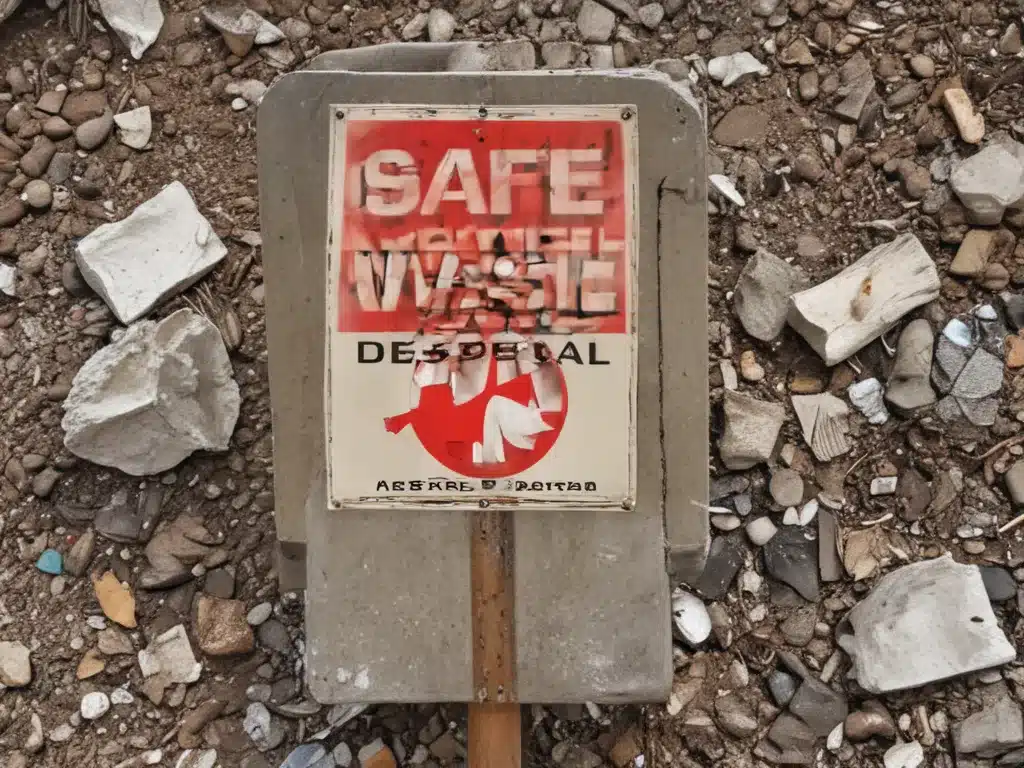Introduction
Proper waste disposal is a critical aspect of maintaining a healthy and sustainable environment. As individuals and businesses, we have a responsibility to ensure that our waste is handled, stored, and disposed of safely and responsibly. In this comprehensive guide, we will explore the importance of safe waste disposal, the different types of waste, and the best practices for managing each category.
Defining Waste
To understand safe waste disposal, we must first define what constitutes waste. Waste encompasses any material or substance that is no longer needed or wanted, and it can take many forms, including solid, liquid, and gaseous. Some common examples of waste include:
- Household waste (e.g., food scraps, packaging materials, paper)
- Industrial waste (e.g., chemical substances, manufacturing byproducts)
- Hazardous waste (e.g., medical waste, radioactive materials)
- Electronic waste (e.g., old computers, televisions, phones)
The Importance of Safe Waste Disposal
Improper waste disposal can have severe consequences for our health, the environment, and the overall well-being of our communities. Some of the potential risks associated with unsafe waste disposal include:
- Pollution of air, water, and soil
- Spread of infectious diseases
- Harm to wildlife and ecosystems
- Exposure to toxic substances
- Depletion of natural resources
By practicing safe waste disposal, we can mitigate these risks and contribute to a cleaner, healthier, and more sustainable future.
Types of Waste and Disposal Methods
To ensure safe waste disposal, it is essential to understand the different types of waste and the appropriate disposal methods for each category. Here are some common types of waste and the recommended disposal practices:
Household Waste
Household waste, also known as municipal solid waste, includes items such as food scraps, paper, plastics, and yard waste. The primary disposal method for household waste is through municipal collection services, where the waste is transported to landfills or recycling facilities.
It is crucial to separate recyclable materials from non-recyclable waste and follow local guidelines for proper disposal. Composting organic waste can also help reduce the amount of waste sent to landfills.
Industrial Waste
Industrial waste is generated from various manufacturing processes and can include hazardous materials, such as chemicals, solvents, and heavy metals. Proper handling and disposal of industrial waste are regulated by environmental agencies and require specialized treatment methods.
Common disposal methods for industrial waste include incineration, chemical treatment, and secure landfilling. Some industrial waste may also be recyclable or reusable, depending on its composition.
Hazardous Waste
Hazardous waste poses significant risks to human health and the environment due to its toxic, flammable, corrosive, or reactive nature. Examples of hazardous waste include medical waste, radioactive materials, and certain types of electronic waste.
Strict regulations govern the handling, storage, and disposal of hazardous waste. Specialized facilities are required for the treatment and disposal of hazardous materials, which may involve incineration, chemical treatment, or secure landfilling.
Electronic Waste (E-waste)
Electronic waste, or e-waste, refers to discarded electronic devices, such as computers, televisions, and mobile phones. E-waste can contain hazardous substances, such as lead, mercury, and cadmium, which can be harmful if not properly disposed of.
Responsible e-waste disposal involves recycling and proper handling of hazardous components. Many electronics manufacturers and retailers offer e-waste recycling programs, and some municipalities have dedicated e-waste collection facilities.
Best Practices for Safe Waste Disposal
To ensure the safe and responsible disposal of waste, it is essential to follow these best practices:
-
Segregate waste: Separate waste into different categories, such as recyclables, compostable materials, and non-recyclable waste. This will facilitate proper disposal and reduce contamination.
-
Follow local regulations: Be aware of and comply with local regulations and guidelines for waste disposal. These regulations are in place to protect public health and the environment.
-
Minimize waste generation: Adopt practices that reduce waste generation, such as reusing materials, composting, and avoiding single-use plastics.
-
Properly store and handle waste: Use appropriate containers and storage methods to prevent spills, leaks, or contamination.
-
Seek professional assistance for hazardous waste: Engage licensed professionals or specialized facilities for the proper handling and disposal of hazardous waste.
-
Recycle and reuse when possible: Explore opportunities to recycle or reuse materials, such as donating or selling items that are still usable.
-
Educate and raise awareness: Promote waste reduction and responsible disposal practices within your community, workplace, or organization.
Case Study: AdamCleaning.uk’s Biohazard Cleaning Services
AdamCleaning.uk is a professional cleaning company that specializes in biohazard cleaning services. Biohazardous waste, such as blood, bodily fluids, and other potentially infectious materials, requires specialized handling and disposal methods to prevent the spread of diseases and protect public health.
AdamCleaning.uk’s team of trained professionals follows strict protocols and adheres to all relevant regulations when dealing with biohazardous waste. They use advanced cleaning techniques and personal protective equipment to ensure the safe removal and disposal of biohazardous materials.
By partnering with AdamCleaning.uk, individuals and businesses can have peace of mind knowing that their biohazardous waste is being handled and disposed of in a safe and responsible manner.
Conclusion
Safe waste disposal is a collective responsibility that requires the commitment and effort of individuals, businesses, and communities. By following best practices, adhering to regulations, and promoting waste reduction and responsible disposal, we can minimize the negative impacts of waste on our health and the environment.
Remember, every effort counts, and by making conscious choices about how we handle and dispose of waste, we can contribute to a cleaner, healthier, and more sustainable future for ourselves and generations to come.







